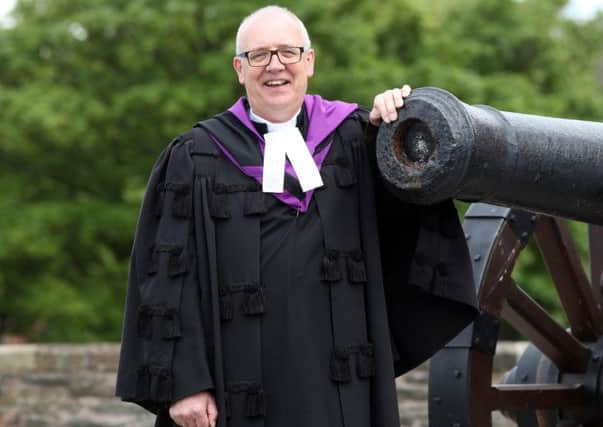Church needs to transform says new Moderator


Dr Craig was speaking at the opening session of the Presbyterian Church’s General Assembly held this evening, Monday 3 June at 7.00pm in the Millennium Forum in Londondonderry after he was installed as Moderator in succession to Dr Roy Patton. It is the first time in 80 years that the annually held General Assembly has met in Derry coming to the northwest as its contribution to events taking place during the UK City of Culture year.
Dr Craig, Minister of the Kilfennan congregation on the city’s Waterside for the last 19 years, welcomed the 1,000 delegates and guests to his city referring to the spotlight that is currently on Derry Londonderry, its culture and the celebration of creative arts.
Advertisement
Hide AdAdvertisement
Hide AdBut in his first address as Moderator Dr Craig asked his listeners to consider a view of culture that was wider and, he admitted, maybe more simplistic, thinking of it as “the way things are done around here.”
Viewing it in this way Dr Craig argued that those not aware of their own culture, saw nothing wrong with it and believed that “if only others could see things our way and adopt our culture then the world would be a much better place.”
“If within the church we are to honour our calling to be a place of transformation then we dare not become prisoners of our own church culture,” he said.
To emphaise this Dr Craig paid tribute to the founder members of his own congregation who had had embraced change and transformation when reluctantly they had closed the Great James Street Church on the Cityside to form the new Kilfennan congregation on the Waterside.
Advertisement
Hide AdAdvertisement
Hide Ad“More than 30 years ago the Presbyterian congregation of Great James Street underwent its own kind of transformation leaving a lovely building where Christian worship had been conducted for some 140 years to begin the new congregation of Kilfennan with no assurance of what the future would hold; leaving very much against their will, as one of the older members put it to me ‘We had to go, but we didn’t want to.’ Yet within a very short time few within the new congregation of Kilfennan doubted the wisdom of the move; and those of us who have benefited from that move have often saluted the courage of those who were willing to respond positively to what was happening around them, and who did not remain prisoners within their own culture.”
Praising those working to transform life within Ireland, particularly police officers, community workers, politicians, businessmen and women, teachers and parents, he said: “There are few, if any, who do not want Ireland, North and South, to be a better place for their children: a place where jobs and opportunities are being created, where sectarian hatred is being eroded and where a shared future has become a reality. There are people who share our Christian faith; others have walked away from their Christian heritage; and they are those who even are opposed to our Christian way of life,” Dr Craig said.
He suggested the Church could have a transformational role in wider society, partnering with those who share common ground, working together for the common good and to transform the lives of others, particularly the weak and marginalised who could not speak for themselves.
He said there was a challenge to the church to speak up and speak out explaining the good and positive lifestyle contained within the way of Jesus: “While we cannot be true to our calling and endorse every lifestyle or government policy we must demonstrate to our community that Jesus came to bring life to the full.”
Advertisement
Hide AdAdvertisement
Hide AdEarlier the opening session the General Assembly had been addressed by outgoing Moderator Dr Roy Patton, who said the world and the church was in a very different place today: “The place, the privilege, the position of the church is very different from a generation or two ago. Faith is reduced to a privatised matter for like-minded people, tolerated as long as it kept private and personal. Long accepted norms and values are set aside. This is a different world, and it is world that can leave us believers very uncertain, fearful of the unknown, unsure of ourselves, as it threatens so much of what we hold dear, and disturbs the comfort of what we know and love.”
Warning the Church not to hanker after the past, becoming more defensive Dr Patton said if the Church lived in the past then it could not see what God was doing now and what he wanted to do through his people today.
“The Christian gospel calls us into a new relationship with God, but it also brings us into a new relationship with our neighbour,” stated Dr Patton who challenged the Church to put this into practice doing itself what it called others to do especially those in political and civic life,” he said.
“In the Church let us be humble enough to say that our public life could be much better if we would practice what we preach. Living this out is essential if we are to have credibility in a deeply sceptical world, and especially among young people if they are going to listen to what we have to say.”